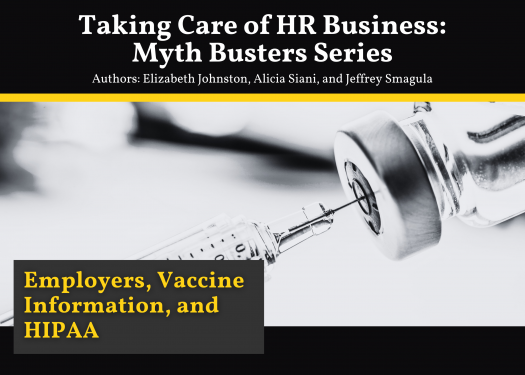Category: Accommodation
HR 2116 and What You Need to Know About Hairstyle Discrimination
On March 18, the United States House of Representatives passed HR 2116 by a vote of 235-to-189. The Creating a Respectful and Open World for Natural Hair Act (a/k/a CROWN Act) , would restrict discrimination on the basis of hair texture or style in Federally Assisted Programs, Housing Programs...
Myth Buster: Employers, Vaccine Information, and HIPAA

With the nation’s ongoing focus on COVID-19 vaccinations, you may be hearing information—and misinformation—about your obligations under HIPAA, the federal Health Information Portability and Accountability Act. In this segment of Myth Busters , we address some common misconceptions about HIPAA and its applicability to employers and employee health information...
Public Accommodation Laws and Vaccination Inquiries
Last week, the EEOC provided updated COVID-19 guidance to employers on vaccines and vaccine incentives in the employment realm. One area, however, in which the agencies has been silent is in the public accommodation space and what organizations can/must/should do to protect themselves and their employees from claims of...
The COVID Vaccine: HR Policy Development Playbook
In March 2021, we worked with MP HR & Payroll Solutions who created an eBook as a resource for employers, "The COVID Vaccine: HR Policy Development Playbook," that assists employers on what to do about the COVID-19 vaccine and employees begin to return to work. The guide covers vaccination...
What Does the COVID-19 Vaccine Mean for My Business?
With the first inoculations of the COVID-19 vaccine making headlines over the past few weeks, employers are starting to plan for the impact this will have on their businesses. The development of a vaccine inspires hope that a return to normalcy (and for some workers – a return to...
The Coronavirus: FAQs for Employers

We’ve been here before. Remember the H1N1 outbreak of 2009? That little bug originated outside of Mexico City. As the virus spread, governments issued travel warnings and schools were on notice to be extra vigilant. There was even a quarantined cruise ship and a run on surgical masks. Sound...
Is Your Website Accessible to Disabled Online Job Seeker?

On March 22, 2019, a federal judge permitted an Ohio man's class action lawsuit to proceed against Ford Motor Company. The lawsuit alleges the company discriminated against disabled job applicants because its online job application wasn't fully accessible. In the past, experts have advised on the importance of having...
12 Days of HR: Flashback Friday—“I Want a Hippopotamus for Christmas” and Employee Requests for Service Animal Accommodations
Because of how often we hear from clients regarding requests for "emotional support" animals to accompany employees to work, we figured a refresher on how to handle these types of situations would be appreciated. While we do not expect many employees to request to bring a "service hippo" to...
On The Twelfth Day of HR, Verrill Dana Gave to Me…
…a stocking full of tip summaries! After a very musical few weeks, we've arrived at the final installment of our 12 Days of HR series. We hope that you've enjoyed singing along with us on our holiday-themed journey through various employment law issues—and learned a few things along the...
12 Days of HR: Oh Come All Ye Faithful—Maintaining an Inclusive Workplace Around the Holidays
There's so much to celebrate at the end of the year, and while it often feels like Christmas steals the spotlight, it's likely that some of your employees also observe Hanukkah, Kwanzaa, and other celebrations throughout the season. In light of this diversity, employers should strive to foster an...
When the Witch in the Office Asks for the Solstice Off, Don’t Laugh, She’s Not Joking
Recent studies reveal that 0.4 percent of Americans (which is between 1 and 1.5 million) identify as Wicca or Pagan, which is more than the people who identify as Presbyterian. What does this mean to you? Well next month, if Sally in the office says that she cannot work...
Is Hiring a Full-Time Interpreter a Reasonable Accommodation?
Maybe. The United States District Court for the District of Connecticut issued a ruling on Defendant's Motion for Summary Judgment in Cadoret v. Sikorsky Aircraft Corp. on February 9, 2018, holding there was a genuine issue of material fact as to whether hiring a full-time American Sign Language interpreter...
Podcast: ADA Title III Public Accommodations: New Accessibility Considerations for Businesses
Most business owners are aware that if their business is public-facing they need to provide access for the physically disabled under the Americans with Disabilities Act. By definition, Title III under the ADA provides that individuals cannot be discriminated against on the basis of disability, "in the full and...
Secret Agent Man with Narcolepsy Lacks Disability Claim
Jacob Abilt (not his real name) was a covert employee for the CIA until his employment was terminated in October 2011. After his termination Abilt argued that despite having informed the CIA he had been diagnosed with narcolepsy, he was terminated as a result. The facts are limited, as...
Till Death Do Compensatory Damages Part . . . Or Not: Eight Circuit Finds Compensatory Damages Claim Under the ADA Lives Past Claimant’s Death
On Thursday, January 19, 2017, the Eighth Circuit issued an opinion in Guenther v. Griffin Constr. Co. , 16-1760 (8 th Cir. Jan. 19, 2017), and held that a claim for compensatory damages brought under the Americans with Disabilities Act (ADA) survives the death of the aggrieved party. The...
Hospital Shows Undue Hardship in Permitting Employee who Refused Influenza Vaccination to Maintain Patient-Care Position
Earlier this month, a District of Massachusetts court issued an opinion which held in part that that a hospital's refusal to permit an employee to maintain a patient-care position after refusing an influenza vaccination on account of religious beliefs was proper. The plaintiff in the matter was an administrative...
Refusal of Employee’s Request for “Peaceful Calm Environment” Does Not Constitute Failure to Accommodate Under the ADA
Last week Judge Joseph N. Laplante of the United States District Court for the District of New Hampshire issued a decision in Posteraro v. RBS Citizens, N.A. , Civil No. 13-cv-416 (D.N.H. Dec. 29, 2015), on Defendants' Motion for Summary Judgment. The case involved a former Citizens Bank employee...
Ba Rump Pa Pum Whaaaa?: Little Drummer Boy and the Out-of-Date Minimum Lifting Requirements
When was the last time you reviewed the "minimum lifting requirements" in your job descriptions? In several cases this year, courts have looked skeptically at job requirements listed in an employer's job description. Specifically, judges have not been willing to take the employer's word for it that lifting, say...
Is an Applicant's Past Drug Addiction and Current Use of "Chocolate Chip Cookies," "Fizzies," and "Wafer" a Disability?
You, like I, may not have been up-to-date on Methadone's street names —but now you are. After that brief (but important) education, we turn to why this information is relevant to your workforce and human resources practice. Earlier this month, the EEOC filed a Complaint against a Maryland-based company...
Employer Successfully Parses the Haze in the Land of Enchantment
Recently, New Mexico employer Presbyterian Healthcare Services successfully defended a claim of disability discrimination after terminating a Physician's Assistant who tested positive for medical marijuana. The case, Smith v. Presbyterian Healthcare Services , involved a Physician Assistant, Donna Smith, who through a staffing agency, Advantage Locum, applied for and...
Is Honesty the Best Policy? EEOC Alleges Honesty Policy Violates ADA
Our parents consistently told us honesty was the best policy. Being honest with the people you interact with, whether, socially, romantically, or professionally, often creates the healthiest relationships in the long run; the EEOC may, however, disagree with me. The EEOC recently sued Aurora Health Care Inc. in the...
High Court Demands Higher Obligation When Dealing With Highest Power: EEOC v. Abercrombie & Fitch Stores, Inc.
Today the Supreme Court issued a decision in the highly anticipated case of EEOC v. Abercrombie & Fitch. Background on the case is available, as is access to the "look policy" which we originally discussed. The question before the Court involved whether the employer or the employee had an...
You Accommodate Your Employees, But Do They Accommodate Your Customers?
Late last month we posted on Indiana's "Religious Freedom" bill. Since then, the bill has been amended and states (including Maine ) with similar pending legislation have reconsidered the propriety of such legislation. Additionally, recently the New York Times published an article focusing on delays and disruptions that were/are...
Sixth Circuit’s Panel Decision Isn’t Built Ford Tough
Earlier this month, the Sixth Circuit issued an en banc decision in the EEOC v. Ford Motor Co. matter concerning the ADA and telecommuting; finding that telecommuting up to four days a week was not a reasonable accommodation. We have been following the opinion both initially and when the...
Nine Months Later Supreme Court "Delivers"
Yesterday the Supreme Court issued its much-anticipated opinion on the Pregnancy Discrimination Act in Young v. UPS vacating the Fourth Circuit's (and District Court's) grant of summary judgment in favor of the employer, UPS. We've previously discussed the background of the case here and here , but for our...
Balancing Religious Rights and Fashion: The High Court Debates Abercrombie’s Look Policy
Yesterday the United States Supreme Court heard oral argument in EEOC v. Abercrombie & Fitch Stores, Inc., No. 14-86, a case previously discussed here , which seeks guidance from the Court as to whether job applicants must provide direct, explicit notice of their religious practices before an employer's accommodation...
Wacky Wednesday: Fear and Loathing in Elementary Education
Last week, the Sixth Circuit ruled that a former Ohio public school teacher who was suffering from pedophobia (the fear of young children), had not presented an Americans with Disabilities Act or Age Discrimination Claim. The Plaintiff requested the school district accommodate Plaintiff's disability, pedophobia, by transferring her from...









